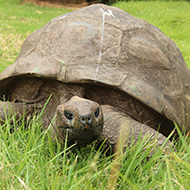Tortoise receives second Guinness World Record

Pictured: Jonathan in the grounds of Plantation House, St Helena.
Jonathan the tortoise, who earned the title of the world's oldest living land animal in 2019, has earned a second Guinness World Records title.
Aged approximately 190 years old, although it is believed that he may be even older, Jonathan has earned the title of oldest chelonian, a category which encompasses turtles, terrapins and tortoises.
Jonathan was brought to Plantation House, St Helena, where he still resides today, in 1882. As records confirm, Jonathan was fully mature upon arrival, so he was at least 50 years old when he arrived.
This was confirmed by a photograph taken sometime between the years 1882 and 1886, which shows Jonathan, fully grown, grazing on the grass in Plantation House's gardens.
Veterinary surgeon Joe Hollins, who takes care of Jonathan, told Guinness World Records: “He enjoys the sun but on very hot days takes to the shade. On mild days, he will sunbathe – his long neck and legs stretched fully out of his shell to absorb heat and transfer it to his core.
“On cold winter days, he will dig himself into leaf mould or grass clippings and remain there all day.
“As befits his age, Jonathan is gentle and enjoys the company of people. Although mostly blind due to cataracts, he has very good hearing and responds especially to his name at feeding time. He also has a fascination with the sounds of tennis when the paddock court is in use.”



 The latest
The latest